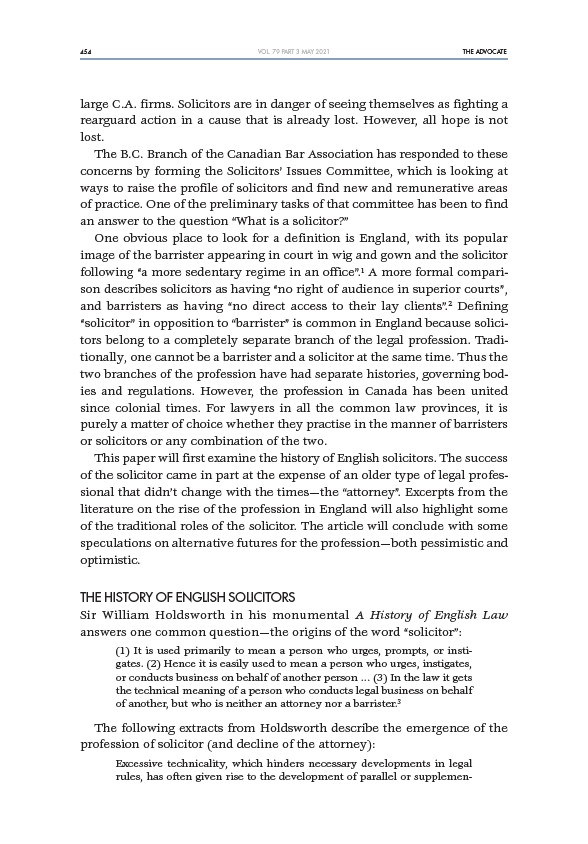
454 THE ADVOCATE
VOL. 79 PART 3 MAY 2021
large C.A. firms. Solicitors are in danger of seeing themselves as fighting a
rearguard action in a cause that is already lost. However, all hope is not
lost.
The B.C. Branch of the Canadian Bar Association has responded to these
concerns by forming the Solicitors’ Issues Committee, which is looking at
ways to raise the profile of solicitors and find new and remunerative areas
of practice. One of the preliminary tasks of that committee has been to find
an answer to the question “What is a solicitor?”
One obvious place to look for a definition is England, with its popular
image of the barrister appearing in court in wig and gown and the solicitor
following “a more sedentary regime in an office”.1 A more formal comparison
describes solicitors as having “no right of audience in superior courts”,
and barristers as having “no direct access to their lay clients”.2 Defining
“solicitor” in opposition to “barrister” is common in England because solicitors
belong to a completely separate branch of the legal profession. Traditionally,
one cannot be a barrister and a solicitor at the same time. Thus the
two branches of the profession have had separate histories, governing bodies
and regulations. However, the profession in Canada has been united
since colonial times. For lawyers in all the common law provinces, it is
purely a matter of choice whether they practise in the manner of barristers
or solicitors or any combination of the two.
This paper will first examine the history of English solicitors. The success
of the solicitor came in part at the expense of an older type of legal professional
that didn’t change with the times—the “attorney”. Excerpts from the
literature on the rise of the profession in England will also highlight some
of the traditional roles of the solicitor. The article will conclude with some
speculations on alternative futures for the profession—both pessimistic and
optimistic.
THE HISTORY OF ENGLISH SOLICITORS
Sir William Holdsworth in his monumental A History of English Law
answers one common question—the origins of the word “solicitor”:
(1) It is used primarily to mean a person who urges, prompts, or instigates.
(2) Hence it is easily used to mean a person who urges, instigates,
or conducts business on behalf of another person … (3) In the law it gets
the technical meaning of a person who conducts legal business on behalf
of another, but who is neither an attorney nor a barrister.3
The following extracts from Holdsworth describe the emergence of the
profession of solicitor (and decline of the attorney):
Excessive technicality, which hinders necessary developments in legal
rules, has often given rise to the development of parallel or supplemen-